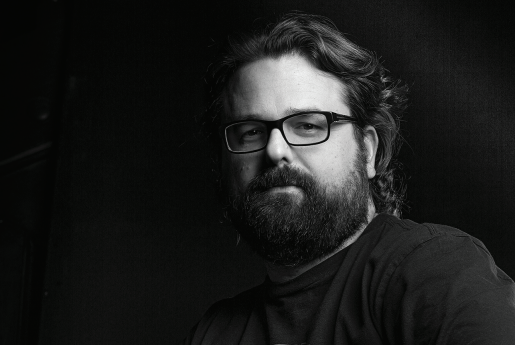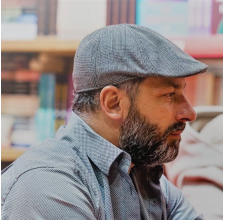Andrej Nikolaidis (Sarajevo, 1974) is a Montenegrin writer and public intellectual, an anti-war activist and promoter of human rights, especially minority rights, who initially became known for his political views and public feuds, appearing on local television and in newspapers with his razorsharp political commentaries. His writings aroused controversy and he received threats, including death threats. Besides, he is one of the most prestigious writers in his country and abroad. In 2011, he was awarded the European Union Prize for literature.
Let me introduce myself: I was very active in the NGO sector, let’s say, during the 1990s, and after that, I was not. Basically, I work now as a columnist, as a journalist, but not an investigational journalist, but a columnist, which means that I write opinions. I used to write for “Vijesti” from Podgorica, “Mladina” from Ljubljana, I published a few articles in “Koha Ditore”, I was writing for “The Guardian” in London, for “Al Jazeera Balkans” in Sarajevo, etc., etc. So, I have been in this journalism business for a long time, at least two decades. But let me get back to my NGO years.
My father founded an NGO, Plima/Batica, because “plima” means “tide”, and I believe in Albanian, it’s “batica”. That was one of the first NGOs that were registered in Montenegro. I believe he founded it and registered it in the first half of the 1990s, and we started to publish a monthly called “Plima/Batica”, that was bilingual. We published it in Montenegrin and Albanian language, too. For those of you who can’t really remember that time, or don’t know much about that time, let me give you some context, because I think it’s really important: That was the time when very militant Serbian nationalism was dominating political and every other segment of life in Montenegro, also, obviously, in Serbia. Those were the times when Serbian nationalism wages wars in Bosnia&Hercegovina and in Croatia. Later, Kosovo will become a victim of that nationalism, but I’ll get to that later.
So, it was obvious that it was hard even to think about a civil society, not to mention to act like a participant of civil society, but still, there were a few NGOs. Slobodan Milosevic was in power and by any sense, his ruling was authoritarian and probably it’s a euphemism, it’s the best thing you can say about his way of conducting the power.
So, obviously, we had a serious issue with financing. For some reason, to run an NGO wasn’t illegal, but the state and the government of Serbia and Montenegro of that time did all they could to make you unable to do your thing. So, I remember that we were forced to go to Budapest, to Soros Foundation, because, as I said, it wasn’t illegal, but it wasn’t legal either, so the whole thing was very strange, looking at it from today’s perspective.
First of all, like in any authoritarian state, it was hard to imagine that you can be a participant in the political life, which is what NGOs should do. Therefore, we were forced to mask our actions, so “Plima” was registered as an NGO for multiculture and ecology, because the Milosevic regime was willing to tolerate that, as long as we were not registered as an NGO that would directly intervene into the political sphere. Of course, we did exactly that, but we were, as I said, masked as an NGO – and I’m quoting – “multiculture and ecology”. Of course, most of our efforts were in the cultural sphere, of course in the ecological sphere, and most of all in the multicultural sphere, because, in those war times, we were talking about tolerance, about inter-ethnic and inter-religious communication, we were obviously very anti-war, and we were, by any means, pro-western, which was exactly the opposite from the mainstream politics in Serbia and Montenegro at that time.
By the middle of the next decade, the whole thing just shifted. When we talk about an NGO now, we are basically talking about anti-corruption initiatives. Back in those days, that wasn’t even an issue. It is easy to imagine why: because, as I said, there was a war, the amount of corruption in the society was unimaginable. Let me say that, during that time when we as Plima/Batica were founded, hyperinflation in Serbia and Montenegro reached its highest peak noticed in Europe after Germany in the 1920s, so the whole thing was, as I said, very strange, because our agenda was pretty clear, it was recognized by, first of all, the U.S. Embassy, by Soros Foundation also, but we were forced, as I said, to mask our actions into a frame which would be considered acceptable by the government.
Of course, anyone who dealt with Soros Foundation, which was the major financer of the NGO sector in Montenegro but also in Serbia during the 1990s, faced the accusations of the government, which was basically telling the public that we were traitors, that we were paid by the so-called International Capital involved in some kind of action which is some kind of… how to put it? You are familiar with conspiracy theories, and you probably laugh at them today, but I’ve got to tell you that back in the 1990s, in Serbia and Montenegro, conspiracy theories were dominant ideology.
Back in the 1990s, all kinds of conspiracy theories were basically multiplied by televisions with national frequencies, retold by the major newspapers and were replicated by all the members of the government, so it is fair to say that the ideology of Milosevic was basically a conspiracy theory event really. It was more dangerous than today because those conspiracy theories left lots of dead people in Bosnia, Croatia, and later in Kosovo.
When we are talking about a really dangerous ideology today, it seems like a joke compared to what we had to face back in those days. Of course, by saying that, I just scratched the very important thing of today, of our situation today. As we are witnessing, even in Europe, and especially in Eastern Europe, not to mention Russia, echoes of that ideology that we faced in Serbia and Montenegro in the 1990s are very strong, even dominant, in lots of European countries. The rise of the far right means just that. They are fueled by conspiracy theories, and even the strongest democracy in the world – and by that I mean the United States of America – had a serious, serious problem with conspiracy theories, with ignorance towards civil society, with ignorance towards democracy and some kind of skepticism against democracy – which also by definition means skepticism or more than skepticism against a civil society – was dominant ideology for at least four years even in the United States of America.
What should we do now? First of all, I believe we as journalists, as public intellectuals, as civil society activists, should stick strongly to our beliefs. Our beliefs are right, and no matter what happened, we should fight for our beliefs. The whole thing that’s going on right now in Europe, especially in Ukraine, where Russia brutally, barbarically invaded an independent state with the obvious plan to put Ukraine back to the Stone Age before they remove their troops, the whole thing that takes place in Balkans where Serbian nationalism is still threatening, it threatens Kosovo, it threatens Montenegro, it threatens Bosnia and Herzegovina, and in some way it even threatens Croatia, which is a part of the European Union. That means that the so-called ghosts of the past are still active, they’re alive and kicking, and that means, as I see it, that we, as the NGO, civil society activists, as public intellectuals, we haven’t done our job, because our job was to defeat that kind of nationalism, that kind of imperial politics, exactly the same politics that Russia and Serbia are applying right now, they’re applying it still. If we did our job, they wouldn’t be able to do that. But we failed, we obviously failed. I’m sorry to say that. Maybe we are not the only ones to blame, but I insist that we have to take some kind of responsibility for that. I was really sad, you know, I’m approaching my 50th birthday, and I gave at least two decades or let’s say two and a half decades of my life in really an open fight for democracy and a fight against nationalism and a fight for western values and a fight for western Balkans region as a part of the European union, and I can’t help but realize that it was pretty much all in vain. I have to admit it that I failed. Kosovo, Bosnia, Montenegro, the whole region: we are obviously not a part of the European Union, as I dreamed that we would be, we are not stable democracies, we have a lot of things to do in order to become really open and democratic societies, and, after all, nationalisms, especially Serbian nationalism, as the single most dangerous nationalism in the Balkans is still very alive, and is still very active.
But we have no other option than to continue our struggle, we have no other option than to act as one, act according to our values, act according to our beliefs. Our goal is just, there is no alternative, actually there is no other good future for this region, as then to become part of the European Union. And that’s not the most important thing. I really believe that more important than that is to westernize our countries, to accept truly western and democratic values, and after that, the membership into the European Union will just come as a result of it. And that’s the way I prefer it to be. It’s, I believe, quite better than to become a part of the European Union as the part of some kind of political compromise, and then to suffer from the diseases of not really consolidated democracies.
I would like to underline that simple thing: that we are on the right path, we as the civil society activists and public intellectuals who really believe in democracy, and even when it seems that the European Union or at least some part of the European Union are turning their backs to democratic values, we are the ones who should be really faithful to them, because sometimes, people on the periphery, and that would be us, are better at understanding the importance of democracy and values of freedom.




